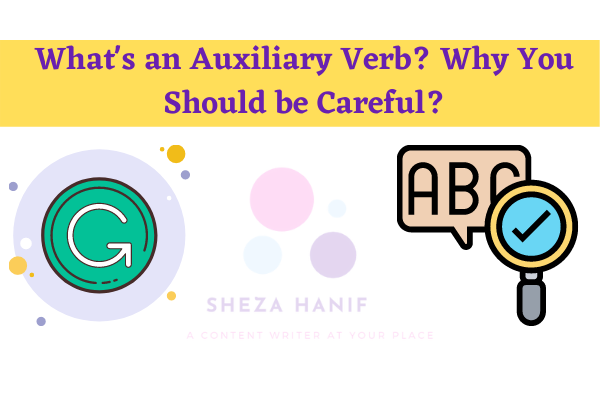Do you know what’s an auxiliary verb? In the first versions of my texts, a stubborn weed often grows. Sometimes I come across verbs in two or three places in a sentence, such as ‘will’, ‘could’, ‘should’, ‘go’, or ‘may’. In short: it contains unnecessary auxiliary verbs.
For example, I recently wrote this sentence in the rough version of an article about dolphins for the Volkskrant:
Dolphins who swim with tourists all day can forage for food less long than their peers who do not receive visits from holidaymakers.
There seems to be little wrong with the sentence, but the auxiliary verbs ‘go’ and ‘can’ are superfluous. Watch:
Dolphins that swim with tourists all day long for less foraging than other dolphins who do not receive visits from holidaymakers.
What’s an auxiliary verb? Why Delete These Verbs?
When I rewrite the first draft of a text, I delete auxiliary verbs in almost every paragraph. That is not surprising. The auxiliary verb is a tempting lubricant for writers. You can cram auxiliary verbs into almost any sentence to change the meaning of your main verb or add nuances. Especially in official texts or with sensitive statements in articles, it is tempting to stuff your sentence with verbs like ‘should’, ‘can’, ‘want’, or ‘may’.
Do You Use Prepositional Phrases? Delete These 11 Expressions
Is it Better to Delete Unnecessary Adjectives from Your Text?
Sensory Writing – 7 Writing Techniques to Engage Your Readers
However, if you want to write attractive texts, the overuse of auxiliary verbs is not smart. They weaken the main verb in your sentence, and thus the image you conjure up with your text.
Take this sentence, also from the first version of my dolphin story.
People with anxiety disorders are increasingly seeing videos of dolphins during their treatment, because the images could help them to relax.
The main verb ‘relax’ is now hidden in a chain of three auxiliary verbs: ‘should’, ‘can’ and ‘help’. If you cut out these weeds, the phrase becomes much clearer.
People with anxiety disorders are increasingly watching dolphin videos during their treatment, because they relax when they see the images.
Of course, the first version of the sentence is more nuanced. But in the second version, the emphasis is more on the most important verb: relax. And this makes your message more powerful.
I myself use the rule that a sentence becomes clearer the more auxiliary verbs you delete. For that ‘weeding’ you need little guts. You can keep fewer strokes in your text if you delete auxiliary verbs. That might be scary. But doing so ensures that your reader does not get lost in a forest of ‘should’, ‘could’ and ‘may’.
Pay special attention to the following auxiliary verbs and constructs.
1 – May
May is often an unnecessary auxiliary verb of courtesy. In this text from the Stichting Jij, the auxiliary verb is even used twice in one sentence.
We are pleased to announce that we can welcome Greta Noordenbos back to the YOU house on Wednesday evening December 12, 2018.
If you want to be polite, you’d better dedicate an extra sentence to it. For example like this:
Greta Noordenbos will speak at the YOU house on Wednesday evening, December 12, 2018. We are proud that she is giving another lecture with us.
2 – Can
This auxiliary verb does not always add anything to a sentence. Often the writer makes an unnecessary battle with ‘can’, and that makes a sentence weaker. For example, you can write:
If you switch to this telephone provider you can save tens of euros per month.
Stronger is:
If you switch to this telephone provider, you will save tens of euros per month.
3 – ‘Becoming’ and ‘Being’
With the auxiliary verbs ‘to be’ and ‘to be’, you create a passive voice. This means that your subject is no longer active, but is undergoing something.
We have been robbed.
We are being tricked
In sentences with these auxiliary verbs, it is not clear who is performing the action. Who fooled us? Who robbed us? If you use the auxiliary verbs ‘become’ and ‘are’ often, your texts will get something impersonal. Take the text below from a patient brochure.
You are recommended to wear a tight-fitting T-shirt with comfortable and possibly high-closing clothing or a scarf when you come to the outpatient clinic, because the electrodes (patches) are applied high on the chest.
Who recommends this to us? Who puts those patches on your chest. Therefore, the version below is a lot more humane.
We recommend that you wear a fitted T-shirt with comfortable and possibly high-closing clothing over it when you come to the outpatient clinic. The lab technician will apply electrodes high to the skin of your chest.
4 – will have to be
Three auxiliary verbs in a sentence are too much. Yet the combination ‘will have to be’ regularly occurs in texts describing future actions. Avoid this woolly construction by naming the person or body performing the action.
Not:
All maples along the Vecht are old and will have to be replaced.
Well:
All maples along the Vecht are old. The municipality will replace the trees.
5 – Can be
Another common passive construction with two auxiliary verbs: ‘can become’. Usually, this combination is unnecessary. So, make the sentence active (by adding an agent) and your problem is solved.
Not:
These monkeys can be considered violent.
Better:
These monkeys can be regarded as violent.
Even better:
These monkeys are violent.
6 – Going to be
The construction ‘going to be’ is hardly ever the best choice. Usually, while describing an action in the future, it is better to limit the number of auxiliary verbs by choosing an active form.
Include this text on a website for entrepreneurs.
Because it is not always clear in advance how many hours will be spent on the company, a lot of responsibility lies with the entrepreneur.
This can be shorter:
Because it is not always clear in advance how many hours entrepreneurs will spend on the company, a lot of responsibility lies with the entrepreneur himself.
7 – Will
The auxiliary verb ‘will’ is often superfluous. Usually, you don’t always have to emphasize in a sentence that the content relates to the future. This is often evident from the context.
So don’t write:
In his lecture tomorrow evening, astronaut André Kuipers will explain what can go wrong if you have to urinate in space.
Well:
In his lecture tomorrow evening, André Kuipers explains what can go wrong when you urinate in space
At last, it is all about auxiliary verbs.
Don’t miss writing tips?
Entry Level Copywriter Jobs: Let’s Talk About
9 Ways to Find Freelance Writing Clients Who Will Actually Pay You
6 unexpected ways you’ll benefit from writing content


What’s Happening i’m new to this, I stumbled upon this I have found It positively useful and it has aided me out loads. I hope to contribute & help other users like its aided me. Great job.